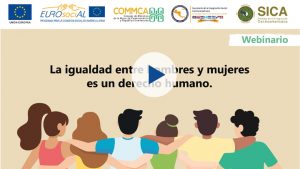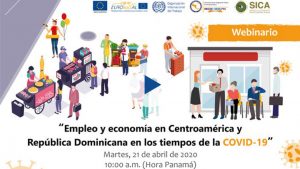Search Filters
March 25, 2022 | -
The Protocol is part of the technical support that EUROsociAL+ provides to the Costa Rican Judiciary to create a mechanism whereby adolescent convicts serving sentences have access to training and employment opportunities that enable their social insertion for socio-educational, integration and equality purposes, including Juvenile Criminal Justice and Restorative Juvenile Justice. The Costa Rican Judiciary is developing public policies on restorative justice, and in this context, an inter-institutional integration and coordination protocol has been devised. The protocol establishes guidelines for creating a mechanism of articulated institutions for generating training and employment opportunities for people sentenced in the execution phase of juvenile criminal sentences, considering the characteristics and vulnerability of these people. The activity ended with two training and awareness-raising workshops on the Protocol.
The first workshop, on 18 March, was aimed at court officials, with the aim of preparing them for the process of building an inter-institutional mechanism for enabling social insertion of young people in the execution stage of juvenile criminal sentences.
The second workshop (25 March) was designed to encourage community organisations and public institutions to take part in the mechanism.
July 8, 2021 | 9:00 am Costa Rica - 5:00 pm Brussels
The analysis of results seeks to make visible the support provided by EUROsociAL+ to Costa Rica’s public policy reforms, as well as the main results and contributions achieved by Costa Rican institutions and the European Union in the framework of the Cooperation Programme for the Improvement of Social Cohesion in Latin America.
After 15 years of working in the region and in the country, the technical report shows that EUROsociAL continues to be a relevant and pertinent instrument for promoting policies that affect the main inequality gaps in both areas, under a multidimensional, complementary and inclusive approach that leaves no one behind. EUROsociAL’s action in Costa Rica has achieved significant sectoral and institutional coverage, allowing the three public powers to be brought together under the same cooperation programme, while promoting citizen participation both in policy construction and in access to new and/or better public services.
This event wants to bring together the institutions involved in this process, in addition to all those Latin American and EU institutions that participate in the design, implementation and evaluation of public policies in any field. Likewise, this meeting is open to participation by anyone with an interest in the matter.
April 20, 2021 | 10:00 am Ciudad de Panamá - 5:00 pm París
This webinar is an exchange of experiences and methodologies regarding the protection of women who are at high risk of violence and who are in refuges, safe houses and shelters in Chile, Costa Rica, Ecuador and Panama.
The workshop is part of the “Guidelines for a System to Protect Women in Cases of High-Risk Violence and Improve the Model of Shelters for Victims” action carried out jointly by the National Institute for Women (INAMU) in Panama and the Gender Equality Policies area of the European Union EUROsociAL+ programme. The action sets out to establish quality standards and strategies to improve the system to protect women in danger of violence, thereby improving the model of shelters for victims under the protection of the Panamanian National Institute of Women. Likewise, the workshop includes a bi-regional perspective by having a panellist from the European Network of Women Against Violence (WAVE- Women Against Violence Europe), to present their working procedures with the participation of the Inter-American Refuges Network(RIRE).
July 15, 2020 | 9:00 am Centroamérica - 5:00 pm Bruselas
This activity is part of a series of webinars, organised by the Central American Integration System (SICA) and the European Union programme EUROsociAL, with the collaboration of the ILO and other UN agencies, dedicated to reflecting intersectorially on the measures to be taken to address the crisis generated by Covid-19, providing a space to share the efforts being made in each country, while offering the opportunity to learn about practices from other countries outside the region and gaining the advice of experts.
Migratory phenomena have been and continue to be a priority on the agenda of the European Union, as well as that of the governments of the Central American region and SICA. Even in the current health emergency, migration is still a salient issue: the expected drop in remittances, the contingents of returned migrants, or the possible new migratory flows that a prolonged economic crisis could cause are three different and complementary aspects of the migration issue in the Covid-19 era discussed in this webinar.
June 17, 2020 | 10:00 am Panamá - 5:00 pm Madrid
The objective of this webinar is to promote a space for reflection and knowledge management with respect to the effects and impacts that covid-19 lockdown measures are having on the lives of women in the countries in the SICA region, with an emphasis on gender violence. This activity is organised by the Secretariat for Central American Social Integration, the General Secretariat of SICA, the Council of Ministers for the Women of Central America and the Dominican Republic, and by the EUROsociAL+ Gender Equioment.
Video Access
May 28, 2020 | 10:00 am Panamá - 9:00 am Centroamérica
the health crisis and the need for economic reactivation in the SICA region was analysed. The covid-19 pandemic has become a huge challenge for everyone, in a region with as many
inequalities as Central America, where the effects on human rights have a more pronounced impact on people in situations of greater vulnerability, such as childhood. It was organised by the Secretariat for Central American Integration (SISCA) and the EUROsociAL+ Social Policies Department together with Central American Educational and Cultural Coordination (CECC).
April 21, 2020 | 10:00 am Panamá - 8:00 am Centroamérica
Date: 21 April 2020Time: 10:00 a.m. Panama – 8:00 a.m. Central America Country or Region: Costa Rica, El Salvador, Guatemala, Honduras, Nicaragua, Panama, Dominican Republiclanguage: Spanish Topic: Covid-19 Policy Area: Social Policies
This webinar was held with the aim of analysing the regional situation, exchanging ideas and seeking solutions appropriate to the realities of each country regarding the protection of the labour force, income and productive capacity in the context of the social distancing measures taken to prevent the spread of the SARS-CoV-2 coronavirus.
Jointly organised by SISCA, SICA, the European Union EUROsociAL+ Programme, with the support of the Office of the International Labor Organization (ILO) for Central America, Haiti, Panama and the Dominican Republic.
Ver el seminario web íntegro
April 14, 2020 | 9:00 am Centroamérica - 5:00 pm Madrid
The impact of the covid-19 pandemic is having a disproportional effect in areas where housing conditions are precarious, such as in informal and unofficial settlements. The objectives of this webinar were to identify responses to the covid-19 crisis and gather inputs for public action in the precarious settlements of Central America as well as for social housing policy, with the aim being to promote structural change with regard to inequalities and segregation in cities.
This webinar was organised by the Secretariat for Central American Social Integration and the General Secretariat of SICA together with #EUROsociAL+ and had the support of the World Food Program. Its aim was to share experiences of using social protection to respond to the covid-19 emergency and its possible economic impacts on the most vulnerable population.
Video Access
👉 Webinar materials: https://cutt.ly/zt3aPGM
👉 Concept Note: https://bit.ly/3e7QqGt
March 31, 2020 | 5:00 pm -
This webinar was organised by the Secretariat for Central American Social Integration and the General Secretariat of SICA together with EUROsociAL+. It also had the support of the World Food Programme, with the aim being to share experiences of using social protection to respond to the covid-19 crisis and its possible economic impacts on the most vulnerable members of the population.
| -
The Seminar will contribute to the dialogue between public decision-makers and different players in society to progress with a new cycle of social policies that requires new responses and actions to address the challenges of justice, equity and social cohesion that the ecological transition requires.
General objective To generate a space for dialogue that brings together a broad group of players (public sector, companies, workers, academia, youth and civil society organisations) regarding the importance of addressing the green transition with a new social pact that supports more and better social policies to accompany this transition, to address its negative impacts and harness the opportunities that are opening up.


